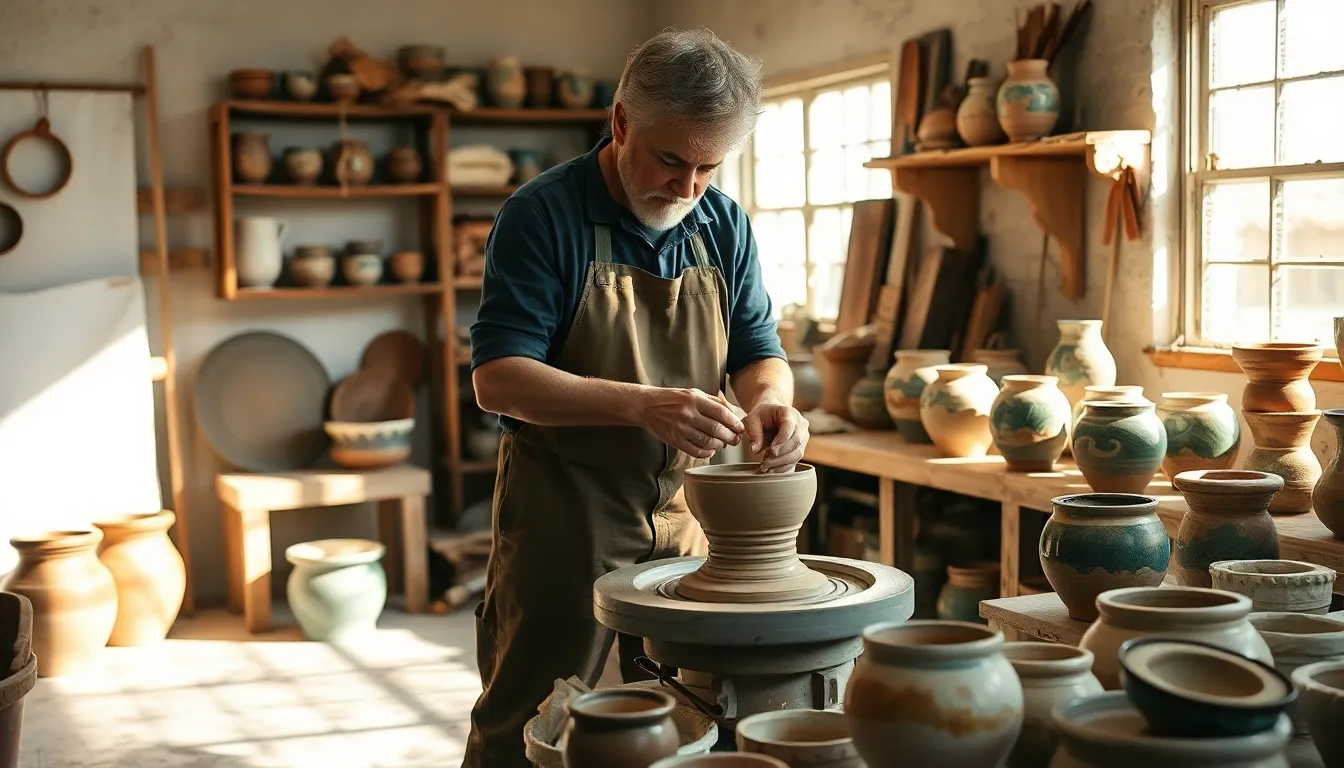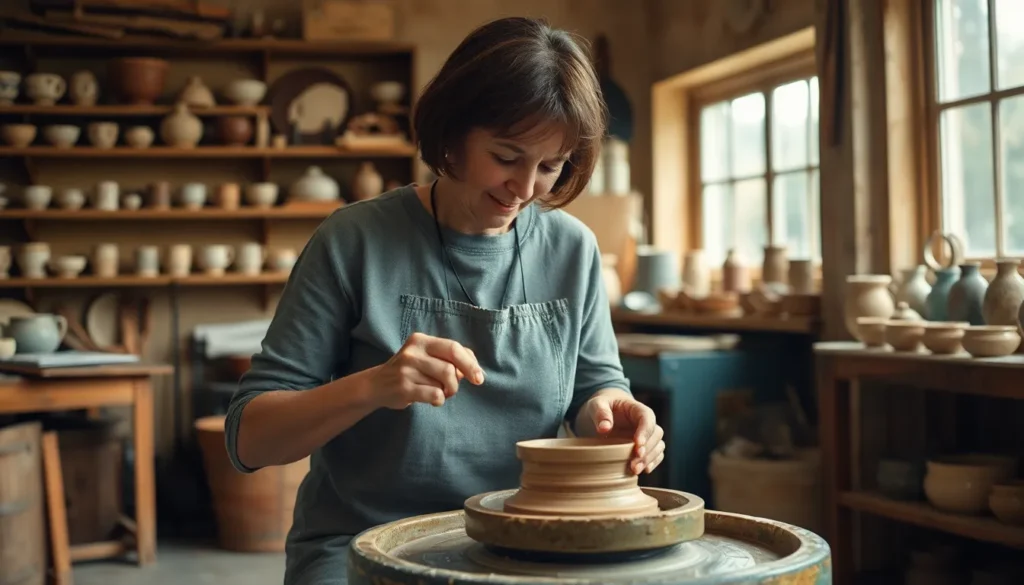In a world dominated by mass production and cookie-cutter items, artisan crafts stand out like a unicorn in a herd of horses. These handmade treasures aren’t just products; they’re stories waiting to be told. Each piece reflects the passion and creativity of its maker, turning everyday items into extraordinary works of art.
Imagine sipping coffee from a mug that feels like a warm hug or wearing jewelry that sparks conversations. Artisan crafts bring a personal touch that mass-produced goods simply can’t match. So why settle for bland when you can embrace the unique? Dive into the colorful world of artisan crafts and discover how these creations can add a dash of charm and personality to your life.
Table of Contents
ToggleOverview Of Artisan Crafts
Artisan crafts represent a profound connection between the creator and their work. These crafts encompass a wide array of handmade items, including pottery, textiles, jewelry, and woodwork. Each piece tells a unique story, highlighting the skills and creativity of the maker.
Artisan products prioritize quality over quantity, emphasizing the use of traditional techniques. Many artisans focus on sustainable practices and locally sourced materials, making their items environmentally friendly. This commitment often results in products that carry emotional and cultural significance.
The rise of the artisan movement reflects a growing desire for individuality in a world dominated by mass production. Consumers increasingly seek out these original creations to enhance their personal spaces and express their identities. Availability of artisan goods in markets and online platforms simplifies the purchasing process for interested buyers.
Connecting with artisans through workshops or local fairs fosters a deeper understanding of the craft. Engaging in hands-on experiences allows individuals to appreciate the time and effort dedicated to each creation. Many artisans also share their techniques and stories, enriching the overall appreciation of their crafts.
Overall, artisan crafts stand as a testament to human creativity and craftsmanship. Each handmade item contributes to a richer cultural tapestry while offering unique opportunities for connection and expression.
Types Of Artisan Crafts

Artisan crafts encompass a variety of handmade items, each reflecting unique skills and cultural significance. Below are some prominent types of artisan crafts.
Pottery
Pottery represents a blend of functionality and artistry. It includes items like bowls, vases, and mugs crafted from clay. Each piece undergoes careful shaping and firing, often resulting in distinctive glazes and textures. Artisans may use hand-building techniques or pottery wheels to create their designs. Local materials and traditional methods enhance the quality and uniqueness of each creation. Many potters participate in community events to showcase their work, making their craft more accessible.
Woodworking
Woodworking involves shaping wood into functional pieces and decorative items. It encompasses furniture, carvings, and utensils, all created with precision. Craftspeople typically select specific types of wood for their durability and aesthetics. Many artisans employ techniques like joinery and carving to bring their visions to life. Workshops often provide individuals opportunities to learn woodworking skills firsthand. This hands-on experience deepens appreciation for the craftsmanship involved in each item.
Textiles
Textiles include a wide array of handcrafted fabrics and garments. Artisans produce items such as clothing, quilts, and tapestries using techniques like weaving, dyeing, and embroidery. Sustainable practices often guide these makers, who prioritize natural fibers and dyes. Many textile artists draw inspiration from cultural traditions, incorporating unique patterns and designs. Community markets frequently display these handmade textiles, allowing buyers to connect directly with the artists. Each fabric tells a story, linking the creator to their heritage.
The Importance Of Artisan Crafts
Artisan crafts hold a vital place in today’s society, offering a counterbalance to mass production with handmade creations. These unique items not only enhance personal experiences but also resonate with deeper cultural and economic meanings.
Cultural Significance
Artisan crafts carry profound cultural significance. Each handmade piece reflects the traditions and values of the community where it originated. Building a bridge between the past and the present, artisans preserve heritage while adapting their craft to modern tastes. Through pottery, textiles, and woodworking, narratives unfold that connect individuals to their ancestry and local practices. Local artisans often feature in community events, reinforcing social bonds and fostering appreciation for creativity. By showcasing craftsmanship, these artisans encourage cultural exchange, allowing diverse traditions to thrive and inspire.
Economic Impact
Artisan crafts significantly contribute to local economies. Supporting artisans creates job opportunities, stimulates growth, and encourages sustainable practices. Craft markets and online platforms promote artisans’ goods, leading to increased visibility and sales. An estimated 60 percent of artisan entrepreneurs cite market access as vital for their businesses. Customers often choose artisan products for their quality, personal touch, and ethical sourcing. This preference drives demand, further energizing the local economy and promoting fair trade practices. With a focus on community engagement, the artisan movement not only uplifts individual creators but also strengthens regional economic resilience.
How To Support Artisan Crafts
Supporting artisan crafts enriches communities and preserves traditions. Several effective methods exist for individuals to contribute to this meaningful movement.
Shopping Locally
Buying from local artisans strengthens community ties. Farmers markets and craft fairs often feature unique, handcrafted items that embody local culture. Supporting these vendors not only promotes individual creators but also encourages sustainable practices. Interested shoppers often find one-of-a-kind products like pottery and textiles at these events. Using social media to follow local artisans can also help consumers discover their work and learn about upcoming markets.
Online Platforms
Numerous online platforms facilitate the purchase of artisan crafts. Websites like Etsy showcase various handmade goods from around the world, making it easier for consumers to connect with artisans. Descriptions often highlight the story behind each item, enriching the buying experience. Craft-focused subscription boxes also offer curated selections of artisan goods, allowing consumers to explore different types of crafts monthly. This online engagement supports artisans while introducing customers to products that reflect creativity and craftsmanship.
Artisan crafts embody a unique blend of creativity and culture that enriches everyday life. By choosing handmade items individuals not only support skilled artisans but also embrace the stories and traditions behind each piece. This movement towards artisanal products fosters a deeper connection to communities and promotes sustainability.
As consumers increasingly seek authenticity and individuality in their purchases they contribute to the revival of traditional craftsmanship. Engaging with local artisans through markets and workshops enhances appreciation for the dedication involved in creating these exceptional items. Ultimately supporting artisan crafts is a step towards preserving cultural heritage while celebrating the beauty of handmade artistry.

